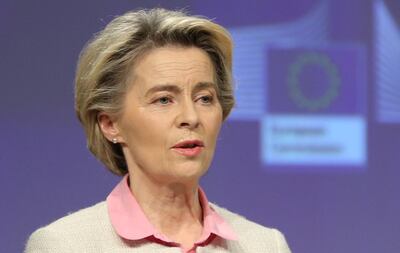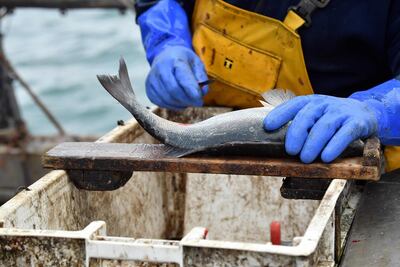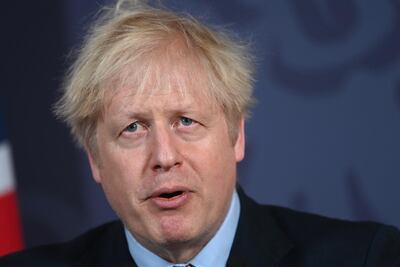The key element to the unprecedented trade deal that helped it over the line was that Britain’s ‘red line’ demands were finally met.
The hard Brexiteers in the Conservative Party are satisfied that the UK will be able to “take back control” by making its own laws with the European Court of Justice no longer able to rule on British legislation.
Furthermore, Prime Minister Boris Johnson has secured a "zero-tariff, zero-quota". With the total in commerce worth an annual £668 million ($904m) it is the biggest trade deal signed by either side.
The Christmas Eve accord has followed an agonisingly long negotiation, particularly intense in the last month, but it is hoped that the detail in the 500-page document will prove agreeable to both sides for decades to come.
Standing in front of two large Union Flags in Downing Street, Mr Johnson gave an optimistic outlook.
“The deal also guarantees that we are no longer in the lunar pull of the EU, we are not bound by EU rules, there is no role for the European Court of Justice and all of our key red lines about returning sovereignty have been achieved,” he said. “It means that we will have full political and economic independence on January 1, 2021.”
TARIFFS
Mr Johnson has secured an agreement which has no tariffs on goods passing between the two unions and in unlimited amounts, known as the ‘zero-tariff zero-quota regime’.
This was crucial as Britain exports 43 per cent of its goods to the EU and imports 51 per cent. A no-deal on World Trade Organisation terms would have meant significant extra tariffs on businesses threatening trade with goods costing more.
“We have signed the first free-trade agreement based on zero tariffs and zero quotas that has ever been achieved with the EU,” Mr Johnson said.
Business breathed a sigh of relief but also wanted greater clarity over services, and for the move to a new regime as smooth as possible.
"This will come as a huge relief to British business at a time when resilience is at an all-time low," said Tony Danker, director general of employers' body the Confederation of British Industry.
OVERSIGHT
The European Court of Justice will now have no say in how disputes are resolved. This was a key demand from hardline Brexiteers to ensure Britain regains its sovereignty. The EU has conceded that it cannot impose penalties. It had made a strong bid for an independent arbitration system.
FISHING
Britain will be an independent coastal state in charge of access to its own waters with its fishermen able to catch a far greater proportion of the available fish than its EU competitors.
Mr Johnson announced a £100m programme to modernise the industry’s infrastructure in expectation of a significant growth when in five years it gains full control of the British waters.
The EU’s quota of fish in British waters is now reduced by 25 per cent over the next five years, with annual renegotiations from there. Crucially to Brexiteers, Britain will now regain ‘sovereignty’ of its coastal waters. However, the quota of a 25 per cent cut is a substantial climbdown from the 80 per cent Britain had originally demanded and the 35 per cent offer London made a few days ago.
The initial response from Britain's fishing industry was disappointment that there was not a bigger reduction in access.
There will be no “cross-retaliation” tariffs if London decides to change quotas after the five years has elapsed. Brussels had demanded unrestrained access to Britain’s waters for a decade.
LEVEL PLAYING FIELD
Both sides have agreed a common baseline for regulations below which neither will go. An independent arbiter will resolve issues over common standards to rule on disputes.
A major concern for Brussels has been that Britain would lower its standards to make firms more competitive, potentially with government financial assistance. Its negotiators required a “level playing field” to ensure regulations remained fair on workers’ rights and the environment.
Mr Johnson said he would rather walk away from a deal rather than accept Britain being tied to EU rules and regulations.
European Commission President Ursula von der Leyen said there are strong measures within this deal that can be taken if one party does not play by the rules. There are strong safeguards, therefore, to ensure there is an incentive for both sides to stick to what they have agreed.
POLICING AND SECURITY
It is understood that Britain will now have greater access to security data to the EU databases that allow countries to deal with criminality, including organised crime and terrorism.

HOLIDAYS AND HEALTHCARE
British travellers will now be able to travel more freely between European countries without being subject to border controls or visa requirements.
A healthcare protocol is understood to ensure that holidaymakers will have access to medical care if they fall ill while abroad.
DEFENCE, FOREIGN AND DEVELOPMENT
Michel Barnier, the EU’s chief negotiator, lamented that there had been no agreement on defence, foreign policy and overseas development. Negotiations on these issues are expected to begin next year.
If it comes to be called the ‘Christmas Eve Accord’, the deal will determine the relationship for generations to come. It will change how Britain is governed and how it trades, with many potential pitfalls ahead and no guarantee that it will lead to greater prosperity.
But 1,645 days since the referendum when Britain narrowly voted to leave the EU – called Brexit – there is widespread relief that a deal had finally been struck.
David Cameron, the former prime minister who resigned the day after the referendum, said it was “positive news” on which to end a difficult year. “The trade deal is very welcome and a vital step in building a new relationship with the EU as friends, neighbours and partners. Many congratulations to the UK negotiating team,” he said in a tweet.
Theresa May, the second prime minister to lose her post over Brexit, also greeted the deal. “Very welcome news that the UK & EU have reached agreement on the terms of a deal - one that provides confidence to business and helps keep trade flowing,” she tweeted.
EDUCATION
Students from European Union nations will have pay more to be educated in Britain as the UK's participation in Erasmus comes to an end.
For students wanting to study in the UK and sample the British lifestyle, their education is now going to cost more, as it will for British students heading the other way.
Erasmus is an EU student exchange scheme that guarantees EU students do not pay more than domestic ones, and Britain will no longer participate after the historic Brexit deal was signed on Thursday.
International scholars injected £25.8 billion ($34bn) into the UK economy in 2015.
HISTORIC DAY
After 10 months of talks, negotiations had been deadlocked. The final hurdle was understood to be over fishing rights for European boats inside British waters.
Those discussions about the legal text continued into Thursday morning as negotiators haggled over the final details.
Even the final hours were not without drama. Despite briefings that an announcement was due early Thursday, more wrangling over fish quotas caused a last-minute hitch, pushing back the announcement by several hours.
But now, there's a deal with elements which can be heralded as a victory for both sides.
Mr Johnson held his arms aloft in victory in a photo he tweeted with the words "The deal is done".
European Commission President Ursula von der Leyen said: “We have finally found an agreement. It was a long and winding road, but we have got a good deal to show for it."
French President Emmanuel Macron said: "The unity and strength of Europe paid off. The agreement with the United Kingdom is essential to protect our citizens, our fishermen, our producers. We will make sure that this is the case."
European Union Brexit negotiator Michel Barnier added: "Today is a day of relief. But tainted by some sadness, as we compare what came before with what lies ahead."




